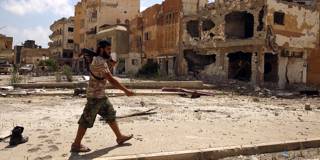PERTH – Das Schicksal des an Öl reichen, in Stämme gespaltenen libyschen Staates ähnelt dem einiger anderer kriegsgeschüttelter Länder im weiteren Nahen Osten, insbesondere Afghanistan, Syrien und Jemen. Überall dort halten innere Streitigkeiten und fehlgeleitete Interventionen aus dem Ausland einen zähen Konflikt am Leben.
In seinen Memoiren mit dem Titel Duty erinnert sich der ehemalige amerikanische Verteidigungsminister Robert Gates an die US-geführten Invasionen in Afghanistan (2001) und im Irak. Er argumentiert, die Vereinigten Staaten seien gut darin, ein Regime zu stürzen, hätten dann aber keine Idee, was an dessen Stelle treten sollte. Der Grund dafür ist seiner Meinung nach, dass die USA die nationalen und regionalen Komplexitäten nicht ausreichend berücksichtigen. Dies gilt auch für die NATO-Militärintervention in Libyen im Jahr 2011.
Die immer noch andauernde libysche Krise hat sowohl interne als auch externe Gründe: Oberst Muammar al-Gaddafis Diktatur wurde im Oktober 2011 während des so genannten Arabischen Frühlings bei einem Volksaufstand gestürzt. Dazu hatte auch eine bewaffnete anglo-französische Intervention beigetragen, die vom Sicherheitsrat der Vereinten Nationen aufgrund der „Verantwortung“ genehmigt wurde, das libysche Volk „zu schützen“.



PERTH – Das Schicksal des an Öl reichen, in Stämme gespaltenen libyschen Staates ähnelt dem einiger anderer kriegsgeschüttelter Länder im weiteren Nahen Osten, insbesondere Afghanistan, Syrien und Jemen. Überall dort halten innere Streitigkeiten und fehlgeleitete Interventionen aus dem Ausland einen zähen Konflikt am Leben.
In seinen Memoiren mit dem Titel Duty erinnert sich der ehemalige amerikanische Verteidigungsminister Robert Gates an die US-geführten Invasionen in Afghanistan (2001) und im Irak. Er argumentiert, die Vereinigten Staaten seien gut darin, ein Regime zu stürzen, hätten dann aber keine Idee, was an dessen Stelle treten sollte. Der Grund dafür ist seiner Meinung nach, dass die USA die nationalen und regionalen Komplexitäten nicht ausreichend berücksichtigen. Dies gilt auch für die NATO-Militärintervention in Libyen im Jahr 2011.
Die immer noch andauernde libysche Krise hat sowohl interne als auch externe Gründe: Oberst Muammar al-Gaddafis Diktatur wurde im Oktober 2011 während des so genannten Arabischen Frühlings bei einem Volksaufstand gestürzt. Dazu hatte auch eine bewaffnete anglo-französische Intervention beigetragen, die vom Sicherheitsrat der Vereinten Nationen aufgrund der „Verantwortung“ genehmigt wurde, das libysche Volk „zu schützen“.